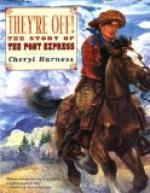The first trip of the Pony Express westbound from St. Joseph to Sacramento was made in nine days and twenty-three hours. East-bound, the run was covered in eleven days and twelve hours. The average time of these two performances was barely half that required by the Butterfield stage over the Southern route. The pony had clipped ten full days from the schedule of its predecessor, and shown that it could keep its schedule — which was as follows:
From St. Joseph to Salt Lake City — 124 hours.
From Salt Lake City to Carson City — 218 hours, from starting point.
From Carson City to Sacramento — 232 hours, from starting point.
From Sacramento to San Francisco — 240 hours, from starting point.
From the very first trip, expressions of genuine appreciation of the new service were shown all along the line. The first express which reached Salt Lake City eastbound on the night of April 7, led the Deseret News, the leading paper of that town to say that: “Although a telegraph is very desirable, we feel well-satisfied with this achievement for, the present.” Two days later, the first west-bound express bound from St. Joseph reached the Mormon capital. Oddly enough this rider carried news of an act to amend a bill just proposed in the United States Senate, providing that Utah be organized into Nevada Territory under the name and leadership of the latter[6]. Many of the Mormons, like numerous persons in California, had at first believed the Pony Express an impossibility, but now that it had been demonstrated wholly feasible, they were delighted with its success, whether it brought them good news or bad; for it had brought Utah within six days of the Missouri River and within seven days of Washington City. Prior to this, under the old stage coach régime, the people of that territory had been accustomed to receive their news of the world from six weeks to three months old.
Probably no greater demonstrations were ever held in California cities than when the first incoming express arrived. Its schedule having been announced in the daily papers a week ahead, the people were ready with their welcome. At Sacramento, as when the pony mail had first come up from San Francisco, practically the whole town turned out. Stores were closed and business everywhere suspended. State officials and other citizens of prominence addressed great crowds in commemoration of the wonderful achievement. Patriotic airs were played and sung and no attempt was made to check the merry-making of the populace. After a hurried stop to deliver local mail, the pouch was rushed aboard the fast sailing steamer Antelope, and the trip down the stream begun. Although San Francisco was not reached until the dead of night, the arrival of the express mail was the signal for a hilarious reception. Whistles were blown, bells jangled, and the California Band turned out. The city fire department, suddenly aroused by the uproar, rushed into the street, expecting to find a conflagration, but on recalling the true state of affairs, the firemen joined in with spirit. The express courier was then formally escorted by a huge procession from the steamship dock to the office of the Alta Telegraph, the official Western terminal, and the momentous trip had ended.




